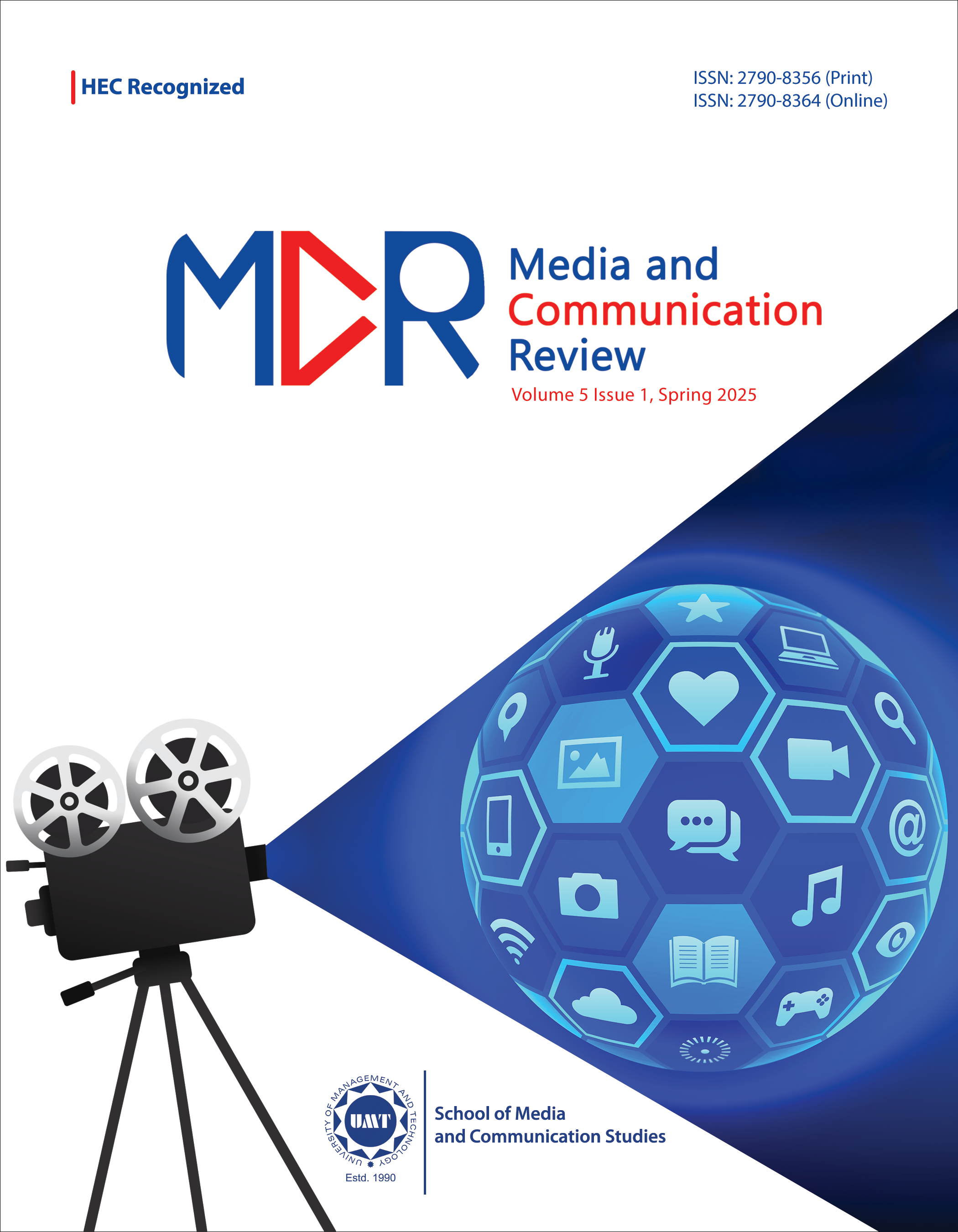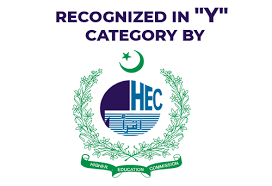The Impact of Information Sharing Behavior on Global Investigative Journalism: Mediation Role of Needs and Sources
Abstract
 Abstract Views: 0
Abstract Views: 0
The current study explores the impact of collaborative information sharing behavior of Pakistani journalists on the understanding of global investigative journalism (GIJ). Moreover, it assesses the mediating contribution of the needs of sharing information for companionship (SIC), sharing information for personal identification (SIPI), and sources used for information sharing (SUIS) under the theoretical perspectives of information acquiring and sharing and information activities in work tasks. Scales of information sharing behavior, needs of SIC, SIPI, SUIS, and the understanding of GIJ were constructed, while the opinions of 300 registered journalists were recorded. Cronbach’s alpha was executed to test the reliability of scales. The impact of demographic characteristics, namely gender and age, was also tested. Independent sample t-test, ANOVA, and linear regression analysis were applied to test the relationships among the variables. PLS-Smart4 was used to test the proposed model. The results showed that information sharing behavior influenced the understanding of GIJ, although this understanding was enhanced due to the contributing role of mediating variables, namely the needs of SIC, SIPI, and SUIS. As compared to gender, age had a greater impact on sharing information to understand GIJ. The study can directly impact journalistic practices and policies. By understanding the specific needs and behaviors of journalists, media organizations can implement more effective strategies to support investigative journalism.
Downloads
References
Anderson, C. W. (2022). All the news that’s fit to click: How metrics are transforming the work of journalists. American Journal of Sociology, 128(3), 983–985. https://doi.org/10.1086/720773
Berglez, P., & Gearing, A. (2018). The Panama and paradise papers: The rise of a global fourth estate. International Journal of Communication, 12, 4573–4592.
Burnett, S., & Lloyd, A. (2019, June 16–19). The road not taken : Locating desire lines across information landscapes [Paper presentation]. Proceedings of the Tenth International Conference on Conceptions of Library and Information Science, Ljubljana, Slovenia.
Chiu, C., Hsu, M., & Wang, E. T. G. (2006). Understanding knowledge sharing in virtual communities : An integration of social capital and social cognitive theories. Decision Support Systems, 42, 1872–1888. https://doi.org/10.1016/j.dss.2006.04.001
Chacón, L. M. C., & Saldaña, M. (2021). Stronger and safer together: Motivations for and challenges of (trans)national collaboration in investigative reporting in Latin America. Digital Journalism, 9(2), 196–214. https://doi.org/10.1080/21670811.2020.1775103
Deuze, M. (2007). Convergence culture in the creative industries. International Journal of Cultural Studies, 10(2), 243–263. https://doi.org/10.1177/1367877907076793
Di Salvo, P. (2022). “We have to act like our devices are already infected”: Investigative journalists and internet surveillance. Journalism Practice, 16(9), 1849–1866. https://doi.org/10.1080/17512786.2021.2014346
Hare, K. (2016, April 4). How ICIJ got hundreds of journalists to collaborate on the Panama papers. Poynter. www.poynter.org/reporting-editing/2016/how-icij-got-hundreds-of-journalists-to-collaborate-on-the-panama-papers/%0A
Kaihlanen, A.-M., Laukka, E., Nadav, J., Närvänen, J., Saukkonen, P., Koivisto, J., & Heponiemi, T. (2023). The effects of digitalisation on health and social care work: A qualitative descriptive study of the perceptions of professionals and managers. BMC Health Services Research, 23(1), Article e714. https://doi.org/10.1186/s12913-023-09730-y
Konow-Lund, M., & Bebawi, S. (2024). Global investigative collaboration. In M. Konow-Lund, M. Park, & S. Bebawi (Eds.), Hybrid investigative Journalism (pp. 97–114). Springer International Publishing. https://doi.org/10.1007/978-3-031-41939-3_7
Kross, E., Verduyn, P., Demiralp, E., Park, J., Lee, D. S., Lin, N., Shablack, H., Jonides, J., & Ybarra, O. (2013). Facebook use predicts declines in subjective well-being in young adults. PLOS ONE, 8(8), Article e69841. https://doi.org/10.1371/journal.pone.0069841
Kross, E., Verduyn, P., Sheppes, G., Costello, C. K., Jonides, J., & Ybarra, O. (2021). Social media and well-being: Pitfalls, progress, and next steps. Trends in Cognitive Sciences, 25(1), 55–66. https://doi.org/10.1016/j.tics.2020.10.005
Kuttschreuter, M., Rutsaert, P., Hilverda, F., Regan, Á., Barnett, J., & Verbeke, W. (2014). Seeking information about food-related risks: The contribution of social media. Food Quality and Preference, 37, 10–18. https://doi.org/10.1016/j.foodqual.2014.04.006
Lloyd, A. (2012). Information literacy as a socially enacted practice. Journal of Documentation, 68(6), 772–783. https://doi.org/10.1108/00220411211277037
Luo, Y., & Fang, K. (2025). Transnational citizen journalism for resistance and solidarity: The case of a sinophone community on Instagram. The International Journal of Press/Politics, 30(2), 462–483. https://doi.org/10.1177/19401612241291812
Rick, J., & Hanitzsch, T. (2024). Journalists’ perceptions of precarity: Toward a theoretical model. Journalism Studies, 25(2), 199–217. https://doi.org/10.1080/1461670X.2023.2293827
Rioux, K. S. (2004). Information acquiring-and-sharing in internet-based environments : An exploratory study of individual user behaviors (Publication No. 3144902). [Doctoral dissertation, The University of Texas at Austin]. ProQuest Dissertations & Theses.
Sampedro, V., López-Ferrández, F. J., & Carretero, Á. (2018). Leaks-based journalism and media scandals: From official sources to the networked fourth estate? European Journal of Communication, 33(3), 255–270. https://doi.org/10.1177/0267323118763907
Stvilia, B., & Gibradze, L. (2022). Seeking and sharing datasets in an online community of data enthusiasts. Library & Information Science Research, 44(3), Article e101160. https://doi.org/10.1016/j.lisr.2022.101160
Toms, E. G. (2018). Information activities and tasks. In K. Byström, J. Heinström, & I. Ruthven (Eds.), Information at work: Information mangement at workplace (pp. 33–62). Facet.
Torbor, M., Sarpong, D., Ofosu, G., & Boakye, D. (2025). In defence of the indefensible: Exploring justification narratives of corporate elites accused of corruption. Journal of Business Ethics, 196(1), 223–240. https://doi.org/10.1007/s10551-024-05703-1
Tsfati, Y. (2008). Journalists, Credibility of. In W. Donsbach (Eds.), The international encyclopedia of communication. Wiley Online Library.
Valkenburg, P. M., Beyens, I., Meier, A., & Abeele, M. M. P. V. (2022). Advancing our understanding of the associations between social media use and well-being. Current Opinion in Psychology, 47, Article e101357. https://doi.org/10.1016/j.copsyc.2022.101357
Copyright (c) 2025 Abbas Rashid Butt, Syed Raghab Ali, Zaheer Ahmad

This work is licensed under a Creative Commons Attribution 4.0 International License.




